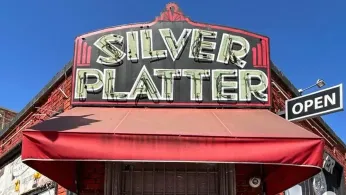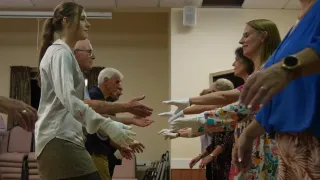
3 hours ago
Silver Platter Bar: Safeguarding a Landmark of Latinx LGBTQ+ History in Los Angeles
READ TIME: 3 MIN.
For more than six decades, the Silver Platter Bar has stood as a crucial gathering space for Latinx queer people in Los Angeles, particularly those who have immigrated from Mexico and Central America. Founded in 1963 in the city’s Westlake neighborhood, the Silver Platter is recognized as the oldest extant Latinx queer nightlife space in Los Angeles, providing a rare haven for marginalized communities navigating both cultural and social exclusion.
The venue’s history is deeply intertwined with the stories of its patrons. Known for welcoming men in “Tejano boots and big cowboy hats,” the bar quickly became a safe space for Latinx gay men and, in the 1990s, for transgender people—referred to as "vestidas" in Spanish—who found few places of acceptance elsewhere in the city. The Silver Platter’s embrace of these communities set it apart as a rare and critical refuge where patrons could be themselves, free from the “ignorance, fear, and hatred of the outside world,” as recounted in the 2012 documentary “Wildness” by Wu Tsang.
In 2025, the nonprofit Latinos in Heritage Conservation selected the Silver Platter Bar as one of 13 sites across the United States to highlight for its significant contributions to Latinx heritage. This recognition underscores the bar’s dual legacy: as both a cultural center for LGBTQ+ nightlife and a testament to the resilience and creativity of Latinx immigrant communities.
The organization’s mission is to spotlight locations that have historically fostered belonging and safety for Latinx people—spaces that are often overlooked in mainstream narratives about queer history. For the Silver Platter, this means bringing renewed attention to its pivotal role in the lives of transgender people, drag performers, and queer immigrants who have shaped its identity since the 1960s.
Despite its storied history, the Silver Platter now faces an uncertain future. In recent years, a developer filed plans to demolish the bar and adjacent storefronts to build a new apartment complex, prompting concern from activists, preservationists, and local officials. While the developer’s application asserted there were no historic resources on the property, a 2008 city survey indicated that the building “appears eligible for the National Register, California Register, and as an L.A. Historic Cultural Monument”.
Community members have voiced frustration with what they see as bureaucratic inertia and a lack of transparency surrounding the demolition process. Preservationists point out that the Westlake neighborhood is a cornerstone of Los Angeles’s queer civil rights movement, and the loss of the Silver Platter would represent the erasure of a vital piece of that legacy.
City officials, including Councilmember Eunisses Hernandez, have expressed support for efforts to preserve the bar, noting the importance of honoring queer history and protecting safe spaces for vulnerable community members. However, advocates acknowledge that the window for action may be closing fast, as regulatory hurdles and development pressures intensify.
The Silver Platter’s significance extends far beyond its age or location. In the 1990s and early 2000s, it became known as one of the few spaces in Los Angeles where transgender people—particularly trans women of color—could gather openly and without fear. The weekly “Wildness” club nights, organized by artist Wu Tsang from 2008 to 2010, drew national attention to the bar’s unique role as both a sanctuary and a stage for the city’s Latinx queer creative community.
The documentary “Wildness” brought the Silver Platter’s story to a wider audience, personifying the bar in the voice of a transgender actress from Guatemala and chronicling its evolution alongside the broader struggles for equality and recognition faced by queer immigrants. For many, the bar’s legacy is inseparable from the stories of resilience, solidarity, and joy shared by its patrons—stories that remain vital as debates over preservation and redevelopment continue.
As the Silver Platter faces possible demolition, preservationists and community members are mobilizing to safeguard the bar’s future. Events such as prayer vigils and public awareness campaigns seek to underscore the importance of protecting spaces that have historically welcomed those excluded from mainstream society.






